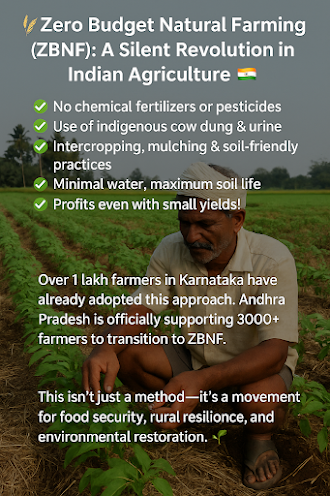Zero Budget Natural Farming
🌾 Zero Budget Natural Farming (ZBNF): A Silent Revolution Rooted in Indian Soil 🇮🇳
In the midst of rising input costs, unsustainable agricultural practices, and growing debt among farmers, a quiet but powerful revolution is unfolding across India's farmlands. It's called Zero Budget Natural Farming (ZBNF)—a farmer-driven movement that redefines how we grow food by going back to our roots.
🌱 What is ZBNF?
Zero Budget Natural Farming is not just a method—it's a philosophy. Developed by Padma Shri awardee Subhash Palekar, ZBNF empowers farmers to produce healthy, chemical-free crops without the need for loans or costly inputs.
The term "zero budget" refers to the elimination of external expenses—farmers use locally available resources like cow dung, urine, jaggery, and native seeds to nourish the soil and protect crops naturally.
🧪 The 4 Pillars of ZBNF
-
Jeevamrutha – A microbial-rich tonic made from local cow dung and urine, jaggery, and pulse flour, which revitalizes soil life and promotes root health.
-
Bijamrita – A natural seed treatment that protects young plants from soil- and seed-borne diseases.
-
Mulching (Acchadana) – Using dried leaves, crop residues, or live crops to retain soil moisture and build organic matter.
-
Whapasa – A principle that focuses on maintaining the right balance of moisture and air in the soil, reducing over-irrigation.
💡 Why ZBNF Matters
-
✅ No synthetic fertilizers or pesticides
-
✅ Low water requirement
-
✅ Use of indigenous cows (Bos indicus)
-
✅ Emphasis on biodiversity and intercropping
-
✅ No dependence on markets for seeds or chemicals
Farmers practicing ZBNF often find that even with lower yields, they make better profits because input costs are nearly zero. And more importantly, the soil heals.
📍 Impact on the Ground
-
Over 1 lakh farmers in Karnataka have already adopted ZBNF.
-
The Government of Andhra Pradesh is supporting 3,000+ farmers to transition to ZBNF through training and infrastructure.
-
Farmers report lower debt, improved soil health, diversified crops, and better nutrition at home.
“In ZBNF, our expenses are very low. It doesn’t matter what the yield is, I still make a profit.”
— Farmer from Belgaum
🚧 The Challenges Ahead
Despite its promise, ZBNF still faces hurdles:
-
❌ Lack of strong policy support across most Indian states
-
❌ Limited marketing channels for organic/natural produce
-
❌ Skepticism among conventional farmers
But the solution lies in awareness, farmer-to-farmer learning, and grassroots support.
🌍 A Global Message from Indian Soil
In an era of climate change and ecological crisis, ZBNF offers more than just an Indian success story—it presents a scalable, sustainable model for food production that respects soil, biodiversity, and rural communities.
Let’s amplify the voices of farmers. Let’s support agroecological movements like ZBNF. Let’s return to a food system rooted in nature, not debt.
🟢 Follow for more stories on sustainable agriculture, regenerative practices, and rural innovation.



Comments
Post a Comment